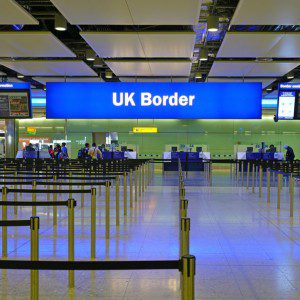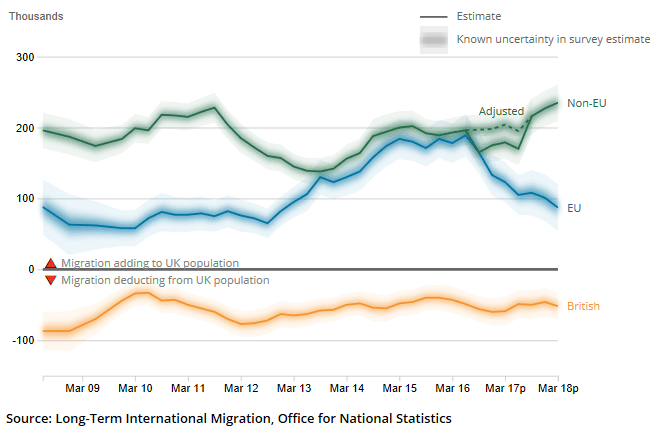Ending Freedom of Movement – the wrong answer to the wrong question

The entire premise for reducing immigration is flawed … ending freedom of movement is a disingenuous way to meet the net immigration thresholds set out in the Conservative Party manifesto. So says our Managing Director, Phil Summerton.
The populist arguments against immigration are not backed up by evidence
At the Conservative Party Conference, Prime Minister Theresa May proudly confirmed that she will end freedom of movement as part of her plan to deliver Brexit.
In doing so she pandered to the politics of the day and wilfully ignored the evidence of experts and the freedoms of her own people.
Immigration has been a hot topic in the UK for the past decade, filling newspaper column inches, that often either pander to, or stir up, anti-immigration sentiment. Such sentiment peaked on 23 June 2016 when 52% of the UK electorate voted to leave the European Union.
Not that immigration was the only factor affecting people’s decision, but certainly the idea that we could not control immigration without taking back control of our borders was a contributing factor in the outcome of the referendum. The arguments made seem intuitive to the point of common sense:
- immigrants take jobs that could go to British people many of whom, in the wake of unprecedented austerity, are struggling to get by
- immigrants take from the public purse more than they contribute and that’s intolerable in the context of oppressive austerity to reduce the public deficit
- the UK government will not be able to completely limit immigration unless it ends freedom of movement with the European Union
The first two arguments are simply wrong and the third is true but disingenuous.
Let’s start with jobs.
The Government’s own Migration Advisory Committee (MAC) published its final report in September and draws the following conclusions on jobs:
taking all the new evidence into account we found that migrants have no or little impact on the overall employment and unemployment outcomes of the UK-born workforce
and wages:
migration is not a major determinate of the wages of UK-born workers
Moreover, both the MAC report and a report on global migration by the Oxford Martin School (OMS) and Citi on Migration and the Economy, identify several positive influences of migration on the economy:
- “On innovation, the available evidence suggests that high-skilled immigrants make a positive contribution to the levels of innovation in the receiving country” (MAC, 2018)
- “The existing literature and the studies we commissioned point towards immigration having a positive impact on productivity” (MAC, 2018)
- “Our overriding conclusion is that migration is conducive to native and aggregate prosperity, especially over longer time frames” (OMS, 2018)
- “In aggregate migration drives innovation but ‘brain-drain’ consequences in sending countries need to be managed” (OMS, 2018)
- “Migration supports the participation of native women in the economy” (OMS, 2018)
In considering the effect of migration on public finances, the MAC reported that for the UK:
EEA migrants pay more in taxes than they receive in benefits
One implication of reducing immigration is therefore that the current government will implement more austerity measures to meet its (misguided) aim of balancing its budget at all cost.
The finding is supported more broadly from a global perspective in the OMS report, that:
Overall, the evidence that we have surveyed suggests that the fiscal impact of migration is either positive or, to the extent that immigrants produce fiscal costs, these costs tend to be small, short-lived and localized
The common-sense arguments are therefore clearly refuted by credible evidence, including the government’s own commissioned research. Despite this, the government is not only disingenuous about the benefits of reducing immigration, it is disingenuous in using the end of freedom of movement to reduce net immigration to tens of thousands.
After ten years of ineffective attempts to limit non-EU immigration, focusing on ending Freedom of Movement seems disingenuous
That net immigration is beneficial seems to be the only explanation that no effective action has been taken on immigration by successive recent governments to limit non-EU net immigration.
For over a decade non-EU net immigration to the UK has averaged around 200,000 people per year, compared to around 100,000 for EU citizens (see Figure 1 sourced from the Office for National Statistics):
Figure 1: Net migration by citizenship, UK

Previous governments could have implemented policies to cut the number of non-EU immigration at any point had this been a genuine priority and should they have genuinely believed the populist arguments in favour of limiting net immigration.
The removal of freedom of movement will allow the government to put EU citizens on the same footing as non-EU citizens and subject them to any new immigration rules the British government develops. However, giving away British citizens’ freedom of movement (without having first limited non-EU immigration) seems a big price to pay.
Evidence shows that our economy and our society benefit from immigration: choosing to end freedom of movement is the wrong answer to the wrong question.
One of the most skilled calligraphers
written on the parchment was scratched out
among them acquired “Moral
drafts of literary works